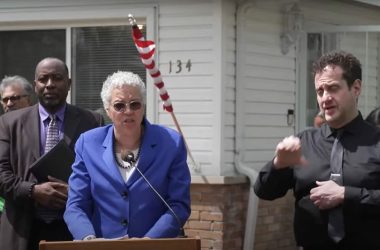
Movie Review
By Bernie Jablonski
Have you ever had a friend in spite of your better judgment? The diverging roads I’ve gone down in my life have sometimes led me into relationships with people whose personality or actions I questioned, but somehow felt a strong liking for and loyalty to. I wondered what kept me attached, but attached I was. And loyal.
In Easy A, high school senior Olive (the endearing Emma Stone) is interrogated in a school bathroom by her not-quite-stable best friend Rhi (Aly Michalka) about a date that Olive had. Refusing to believe that Olive called the date off, Olive ultimately tells Rhiannon that she did indeed enjoy a sexual encounter with the mystery man. Hiding in one of the stalls and hearing everything is Marianne (Amanda Bynes, in her final role before her “retirement”), a fiercely committed Christian who immediately condemns Olive to hell and departs to spread the news.
Which, aided by electronic help, spreads widely and rapidly. Olive immediately gets a reputation as a tramp, and she is soon approached a by a gay student, Brandon (Dan Byrd), who has been ruthlessly picked on and assaulted by his fellow students. He feels that if a rumor were to spread concerning him and Olive, his stock would rise in the eyes of the student body and he would be left alone. After initial revulsion, Olive agrees to this “fake affair,” and at a well-attended party, they go into a bedroom (leaving plenty of bread crumbs for the other guests to follow to the door, and inside, they emit as many of the expected sounds of coitus that they can think of. On leaving the room, Brandon is received as a hero, and Olive is soon paid by Brandon for her “services.” In gift certificates.
Other downtrodden and tortured young men, gay or otherwise, soon come to Olive for help in elevating their status. Olive’s reputation as a slut increases, helped by the fact that, deciding to give the public what it wants, she dresses provocatively and wears a scarlet “A” on her clothes, echoing Hester Prynne of The Scarlet Letter, the book they are discussing in class by the almost-too-good-to-be-true English teacher, Mr. Griffith. (Honestly, you’ve seen this before in movies: a teacher speaking in intensely general terms to a totally absorbed class in a period that ends in about five minutes. At one point, he starts to rap the main themes of Scarlet Letter, then mercifully says he’s not going to rap. All of this is tolerable because he is played by the great Thomas Haden Church.)
Forces conspire against Olive. A boy she’s always carried a torch for (Todd Badgley) seems to be interested in her in spite of her slut act. The rabid Christian girl is conspiring to have Olive kicked out of school. And then something really serious happens that makes Olive question what she’s doing.
Emma Stone enchanted me in Zombieland, (once I got past another “Olive,” Abigail Breslin, holding a machine gun) a movie not filled with a lot of enchanting things. Her Olive comes across as a believable high-school student- if you believed, as I did, that Juno Macguff was a believable high school student. Getting into that universe would be helpful. Stone delivers the witty dialogue flawlessly and believably, and she glows with an aura of warmth and affection for her friends and family, in spite of the act she must put on. Her commanding and skillful work as a protagonist truly makes this a breakout part for her.
The adults in the movie, admittedly, are wonderfully idealized stereotypes, but in the hands of the actors who play them, they, too, are a joy to watch. Olive’s father Dill (Stanley Tucci) and mother Rosemary (Patricia Clarkson) (yes, Olive’s family are all named after foods, as is her adorable adopted black brother Chip, played by Bryce Clyde Jenkins) are so outrageously liberal and accepting, they do make the aforementioned Juno’s parents seem like poster children for the Tea Party. The father hears his daughter grunting out of anger in her bedroom, and when he inquires, she says that nothing is going on, and asks him to leave. He does, saying “Give ‘em hell” as he closes her door. In another scene, Olive and her mother sit on the hood of a car in front of one of those hilly twinkly-light California vistas. Rosemary starts to talk about the many affairs she had before getting married (most of them, it turns out, with men) and Olive is repulsed. They laugh, and the mother gives her daughter sound advice.
On the one hand I’m a bit left-of-center myself, and on the other I’ve seen this kind of scene before, but I did enjoy those scenes because of the sincerity and great commitment of the actors. Another adult who scores is Church’s Mr. Griffith, the English teacher. If you’ve seen most of Thomas Haden Church’s work, you will find his performance a welcome variation on it. He speaks in short mock-serious bursts when he’s performing as a teacher or when he’s trying to straighten out misbehaving students outside of class. He finds Olive’s personality change disturbing, and when he reaches out to her, uses the same kind of charm, but then listens as a keenly concerned adult. We also see, later in the movie, when this hip swagger can’t help him.
Lisa Kudrow, as his wife, intrigues us at first because she doesn’t seem to be playing the neurotic, befuddled character she so often does. This, too, winds up being a façade, but in the circumstances the character finds herself in, her reactions come across as believable, and Kudrow puts a spin on her usual schtick.
There is a refreshing lack of stereotyping among the young characters ( there are no superfluous one-dimensional characters screaming for attention, as in the good old 1980s). Amanda Bynes’ Marianne may come close as what we used to call a “Jesus freak” (the scenes with her followers are quietly hilarious), but her vulnerability saves her from being a stereotype. Penn Badgley, as the mascot, Woodchuck Todd, is likable and not too-good-to-be-true. He is on the five-year program, after all.
One interesting thing about the comedy in the movie is the irony of how electronic media is portrayed. All means of communication used by the young (cell phones, the Internet, and other devices I have not yet been able to explore) are used to set the countryside on fire with rumors, but it is the Internet that saves Olive in the end.
I enjoyed Easy A from start to very satisfying finish. Not having seen a lot of teen-oriented movies since the 1980s (all those John Hughes movies, enjoyable as they were, tend to blur together; only The Breakfast Club stands out), I can tell you that Easy A is right up there with my favorite teen movie, Election, without the biting satire and the bitter aftertaste. The lack of abusive language and gross-out humor are plusses as well. Find that person whose friendship you can’t explain and go to this movie and embrace your true selves.








